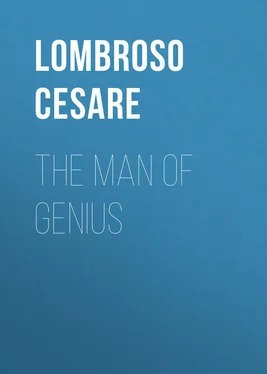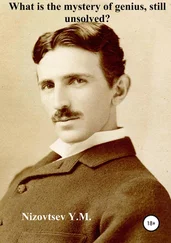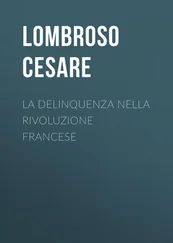Cesare Lombroso - The Man of Genius
Здесь есть возможность читать онлайн «Cesare Lombroso - The Man of Genius» — ознакомительный отрывок электронной книги совершенно бесплатно, а после прочтения отрывка купить полную версию. В некоторых случаях можно слушать аудио, скачать через торрент в формате fb2 и присутствует краткое содержание. Жанр: foreign_antique, foreign_prose, на английском языке. Описание произведения, (предисловие) а так же отзывы посетителей доступны на портале библиотеки ЛибКат.
- Название:The Man of Genius
- Автор:
- Жанр:
- Год:неизвестен
- ISBN:нет данных
- Рейтинг книги:5 / 5. Голосов: 1
-
Избранное:Добавить в избранное
- Отзывы:
-
Ваша оценка:
- 100
- 1
- 2
- 3
- 4
- 5
The Man of Genius: краткое содержание, описание и аннотация
Предлагаем к чтению аннотацию, описание, краткое содержание или предисловие (зависит от того, что написал сам автор книги «The Man of Genius»). Если вы не нашли необходимую информацию о книге — напишите в комментариях, мы постараемся отыскать её.
The Man of Genius — читать онлайн ознакомительный отрывок
Ниже представлен текст книги, разбитый по страницам. Система сохранения места последней прочитанной страницы, позволяет с удобством читать онлайн бесплатно книгу «The Man of Genius», без необходимости каждый раз заново искать на чём Вы остановились. Поставьте закладку, и сможете в любой момент перейти на страницу, на которой закончили чтение.
Интервал:
Закладка:
Those who, without frequenting a lunatic asylum, wish to form a fairly complete idea of the mental tortures of a monomaniac, have only to look through Rousseau’s works, especially his later writings, such as the Confessions , the Dialogues , and the Rêveries . “I have very ardent passions,” he writes in his Confessions , “and while under their influence, my impetuosity knows no bounds; I think only of the object which occupies me; the entire universe besides is nothing to me; but this only lasts a moment, and the moment which follows throws me into a state of prostration. A single sheet of fine paper tempts me more than the money to buy a ream of it. I see the thing and am tempted; if I only see the means of acquiring it I am not tempted. Even now, if I see anything that tempts me, I prefer taking it to asking for it.”
This is the distinction between the kleptomaniac and the thief: the former steals by instinct, to steal; the latter steals by interest, to acquire: the first is led away by anything that strikes him; the second is attracted by the value of the object.
Dominated by his senses, Rousseau never knew how to resist them. The most insignificant pleasure, he says, so long as it was present, fascinated him more than all the joys of Paradise. In fact, a monk’s dinner (Father Pontierre) led him to apostasy, and a feeling of repulsion caused him to abandon cruelly an epileptic friend on the road.
It was not only his passions that were morbid and violent; his intelligence also was affected from his earliest days, as he shows in his Confessions : “My imagination has never been so cheerful as when I have been suffering. My mind cannot beautify the really pleasant things that happen to me, only the imaginary ones. If I wish to describe spring well, it must be in winter.” Real evils had little hold on Rousseau, he tells us; imaginary evils touched him more nearly. “I can adapt myself to what I experience, but not to what I fear.” It is thus that people kill themselves through fear of death.
On first reading medical books Rousseau imagined that he had the diseases which he found described, and was astonished, not to find himself healthy, but to find himself alive. He came to the conclusion that he had a polypus at the heart. It was, as he himself confesses, a strange notion, the overflow of an idle and exaggerated sensibility which had no better channel. “There are times,” he says, “in which I am so little like myself that I might be taken for a man of quite different character. In repose I am indolence and timidity itself, and do not know how to express myself; but if I become excited I immediately know what to say.”
This unfortunate man went through a long series of occupations from the noblest to the most degrading; he was an apostate for money, a watchmaker, a charlatan, a music-master, an engraver, a painter, a servant, an embryo diplomatic secretary; in literature and science he took up medicine, music, botany, theology, teaching.
The abuse of intellectual work, especially dangerous in a thinker whose ideas were developed slowly and with difficulty, joined to the ever-increasing stimulus of ambition, gradually transformed the hypochondriac into a melancholiac, and finally into a maniac. “My agitations and anger,” he wrote, “affected me so much that I passed ten years in delirium, and am only calm to-day.” Calm! When disease, now become chronic, no longer permitted him to distinguish what was real, what was imaginary in his troubles. In fact, he bade farewell to the world of society, in which he had never felt at home, and retired into solitude; but even in the country, people from the town zealously pursued him, and the tumult of the world and notions of amour-propre veiled the freshness of nature. It is in vain for him to hide himself in the woods, he writes in his Rêveries ; the crowd attaches itself to him and follows him. We think once more of Tasso’s lines: —
“e da me stesso
Sempre fuggendo, avrò me sempre appresso.”
Rousseau doubtless alluded to these lines when he wrote to Corancez that Tasso had been his prophet. He wrote later that he believed that Prussia, England, France, the King, women, priests, men, irritated by some passages in his works, were waging a terrible war against him, with effects by which he explained the internal troubles from which he suffered.
In the refinement of their cruelty, he says in the Rêveries , his enemies only forgot one thing – to graduate their torments, so that they could always renew them. But the chief artifice of his enemies was to torture him by overwhelming him with benefits and with praise. “They even went so far as to corrupt the greengrocers, so that they sold him better and cheaper vegetables. Without doubt his enemies thus wished to prove his baseness and their generosity.” 174 174 Dialogues , i.
During his stay in London his melancholia was changed into a real attack of mania. He imagined that Choiseul was seeking to arrest him, abandoned his luggage and his money at his hotel, and fled to the coast, paying the innkeepers with pieces of silver spoons. He found the winds contrary, and in this saw another indication of the plot against him. In his exasperation he harangued the crowd in bad English from the top of a hill; they listened stupefied, and he believed he had affected them. But on returning to France his invisible enemies were not appeased. They spied and misinterpreted all his acts; if he read a newspaper, they said he was conspiring; if he smelled the perfume of a rose, they suspected he was concocting a poison. Everything was a crime: they stationed a picture-dealer at his door; they prevented the door from shutting; no visitor came whom they had not prejudiced against him. They corrupted his coffee-merchant, his hairdresser, his landlord; the shoeblack had no more blacking when Rousseau needed him; the boatman had no boats when this unfortunate man wished to cross the Seine. He demanded to be put in prison – and even that was refused him.
In order to take from him the one weapon which he possessed, the press, a publisher, whom he did not know , was arrested and thrown into the Bastille. The custom of burning a cardboard figure at the mi-carême had been abolished. It is re-established, certainly to make fun of him and to burn him in effigy; in fact, the clothes placed on it resembled his. 175 175 Dialogues , ii.
In the country he meets a child who smiles at him; he turns to respond, and suddenly sees a man whom, by his mournful face (note the method of recognition), he sees to be a spy placed by his enemies.
Under the constant impression of this monomania of persecution he wrote his Dialogues sur Rousseau jugé par Rousseau , in which, in order to appease his innumerable enemies he presented a faithful and minute portrait of his hallucinations. He began to distribute his defence, in a truly insane manner, by presenting a copy to any passer-by whose face did not appear prejudiced against him by his enemies. It was dedicated: “ A tous les Français aimant encore la justice et la vérité .” In spite of this title, or, perhaps, because of it, he found no one who accepted it with pleasure; several even refused it.
No longer able to put trust in any mortal he turned, like Pascal, to God, to whom he addressed a very tender and familiar letter; then in order to ensure the arrival of his letter at its destination, he placed it together with the manuscript of the Dialogues on the altar of Nôtre-Dame at Paris. Then, having found the railing closed, he suspected a conspiracy of Heaven against him.
Dussaulx, who saw him often in the last years of his life, writes that he even distrusted his dog, finding a mystery in his frequent caresses. 176 176 Bugeault, Étude sur l’état mental de Rousseau , 1876, p. 123.
The délire des grandeurs was never absent; it may be seen continually in the Confessions , in which he defies the human race to show a better being than himself.
Интервал:
Закладка:
Похожие книги на «The Man of Genius»
Представляем Вашему вниманию похожие книги на «The Man of Genius» списком для выбора. Мы отобрали схожую по названию и смыслу литературу в надежде предоставить читателям больше вариантов отыскать новые, интересные, ещё непрочитанные произведения.
Обсуждение, отзывы о книге «The Man of Genius» и просто собственные мнения читателей. Оставьте ваши комментарии, напишите, что Вы думаете о произведении, его смысле или главных героях. Укажите что конкретно понравилось, а что нет, и почему Вы так считаете.












